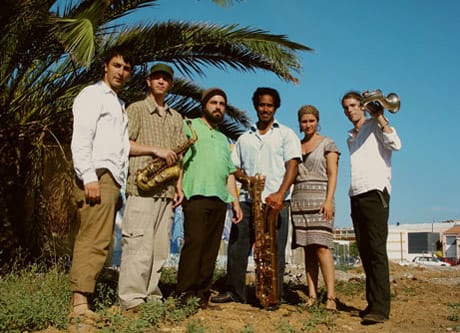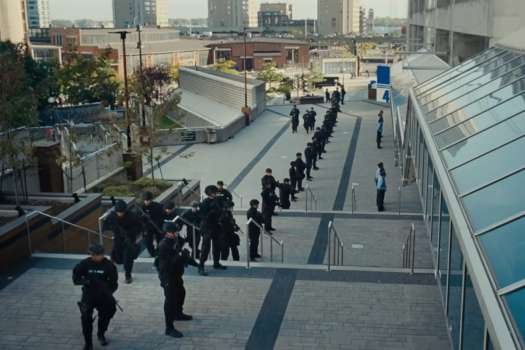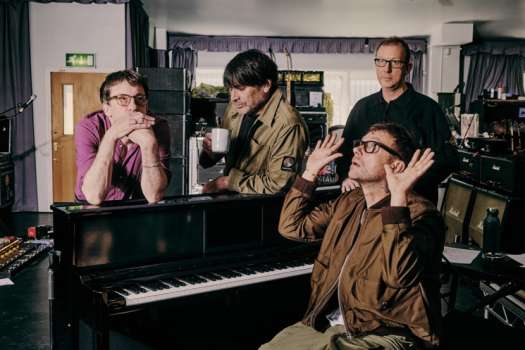This marks the Souljazz Orchestra's tenth year together and if their fifth album Solidarity is any indication, the Ottawa ON-based Afrofunk collective are pulling out all the stops and making this an anniversary to remember with their finest offering yet. Freedom No Go Die (from 2006) and 2010's all-instrumental Rising Sun (their first album on Strut) as well as a killer live act won them a fervent domestic and European following, not to mention the endorsement of one Gilles Peterson. Solidarity sees the unit collaborating with noted guest vocalists including Slim Moore (of the Mar-Kays fame), that push the orchestra's conscious party of Afrobeat, Caribbean, Brazilian and tropical sounds to a new plateau.
What are you up to right now?
Keyboardist, percussionist, vocalist Pierre Chretien: Oh, it's the release day for the new album [Solidarity] so I'm updating the website and all that kind of stuff.
The Souljazz Orchestra is celebrating its tenth anniversary this year. How's that feel?
It feels good. We've been together for quite a while now and we've come quite a ways from the early days. It's our fifth album and we're very excited.
I read you toured the States for the first time this year. How was that and where else will be heading this year?
It was our first big tour. We'd played Brooklyn a couple years back but it was just a one-off so this was our first big one. It went great and it actually was a long time coming but we're kind of glad that we waited this long, the hype was kind of built up you know. We've got a big world tour planned for the fall, we're doing Europe for a month starting October ten and then Canada for a few weeks and then back off to the States.
How do you feel Solidarity compares with your last release?
Well, our last one was strictly acoustic, instrumental, really jazzy. With this one we kind of wanted to do the opposite. Go pretty electric, use as many electric instruments as possible: old organs, old electric pianos, guitars, bass. For this one we wanted to be really vocal-oriented so we brought in a bunch of guests: El Hadji "Elage" M'baye from Senegal, Slim Moore, a Jamaican-Canadian singer that lives in Ottawa and Rommel Teixeira Ribeiro, originally from Brazil. It makes for an interesting mix of styles and I think it turned out pretty cool.
Why did you choose those singers in particular to appear on this album?
Well, it's one thing to collaborate with just anyone but these three guys are actually really good friend too. We're all living in the Ottawa region so we've been working closely together for the last couple of years. This is the first time we had a chance to record together in Souljazz. It's a little more enjoyable if you're old friends and on the same wavelength.
The album definitely has a grittier sound than the last. I read you recorded the album on an old eight-track machine. I was wondering if you could tell me about recording it.
It's pretty cool. Our producer found that old eight-track at an RCMP garage sale for 50 bucks [laughs]. We love the sound of analog, it's a bit warmer and organic. We recorded pretty hot to tape with the needle in the red for that distorted kind of sound. It's tricky but it worked out. It was a ballsy move. We also decided to do the whole thing in mono and you don't see that a lot these days.
You're known for your live performances. How much of that do you try to bring into the studio experience?
This one's a lot closer to our live show. The last one had a lot of orchestral instruments, but those are a lot of the things that are harder to do live. The album's a lot more upbeat too, which is closer to our live show, it's more of a dance kind of thing than a sit-down beard-stroking kind of thing.
What's the significance of the title Solidarity?
It represents the whole unity in diversity feel of the album. All of the participants are from different cultural and musical backgrounds, all coming together to make this music with a common message.
How do you define the band's sound?
It's a mix of styles for sure. It's a mix of soul, jazz, Latin and tropical styles all done with a heavy, gritty feel.
Why do you think that the audience for this style of music has grown so exponentially over the years?
I think people might be getting tired of the same old, same old kind of thing. I think a lot of kids raised on hip-hop maybe later on started digging into samples of funk, soul and jazz and from there people are looking for fresh new sounds, starting to look into other sources, maybe digging the African, Latin and Caribbean music as well.
What are you up to right now?
Keyboardist, percussionist, vocalist Pierre Chretien: Oh, it's the release day for the new album [Solidarity] so I'm updating the website and all that kind of stuff.
The Souljazz Orchestra is celebrating its tenth anniversary this year. How's that feel?
It feels good. We've been together for quite a while now and we've come quite a ways from the early days. It's our fifth album and we're very excited.
I read you toured the States for the first time this year. How was that and where else will be heading this year?
It was our first big tour. We'd played Brooklyn a couple years back but it was just a one-off so this was our first big one. It went great and it actually was a long time coming but we're kind of glad that we waited this long, the hype was kind of built up you know. We've got a big world tour planned for the fall, we're doing Europe for a month starting October ten and then Canada for a few weeks and then back off to the States.
How do you feel Solidarity compares with your last release?
Well, our last one was strictly acoustic, instrumental, really jazzy. With this one we kind of wanted to do the opposite. Go pretty electric, use as many electric instruments as possible: old organs, old electric pianos, guitars, bass. For this one we wanted to be really vocal-oriented so we brought in a bunch of guests: El Hadji "Elage" M'baye from Senegal, Slim Moore, a Jamaican-Canadian singer that lives in Ottawa and Rommel Teixeira Ribeiro, originally from Brazil. It makes for an interesting mix of styles and I think it turned out pretty cool.
Why did you choose those singers in particular to appear on this album?
Well, it's one thing to collaborate with just anyone but these three guys are actually really good friend too. We're all living in the Ottawa region so we've been working closely together for the last couple of years. This is the first time we had a chance to record together in Souljazz. It's a little more enjoyable if you're old friends and on the same wavelength.
The album definitely has a grittier sound than the last. I read you recorded the album on an old eight-track machine. I was wondering if you could tell me about recording it.
It's pretty cool. Our producer found that old eight-track at an RCMP garage sale for 50 bucks [laughs]. We love the sound of analog, it's a bit warmer and organic. We recorded pretty hot to tape with the needle in the red for that distorted kind of sound. It's tricky but it worked out. It was a ballsy move. We also decided to do the whole thing in mono and you don't see that a lot these days.
You're known for your live performances. How much of that do you try to bring into the studio experience?
This one's a lot closer to our live show. The last one had a lot of orchestral instruments, but those are a lot of the things that are harder to do live. The album's a lot more upbeat too, which is closer to our live show, it's more of a dance kind of thing than a sit-down beard-stroking kind of thing.
What's the significance of the title Solidarity?
It represents the whole unity in diversity feel of the album. All of the participants are from different cultural and musical backgrounds, all coming together to make this music with a common message.
How do you define the band's sound?
It's a mix of styles for sure. It's a mix of soul, jazz, Latin and tropical styles all done with a heavy, gritty feel.
Why do you think that the audience for this style of music has grown so exponentially over the years?
I think people might be getting tired of the same old, same old kind of thing. I think a lot of kids raised on hip-hop maybe later on started digging into samples of funk, soul and jazz and from there people are looking for fresh new sounds, starting to look into other sources, maybe digging the African, Latin and Caribbean music as well.




